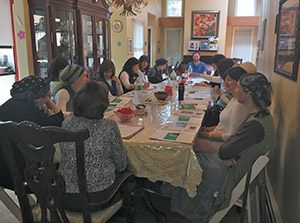
Just because school’s out doesn’t mean that Project S.A.R.A.H. takes a vacation from its mission of keeping children in our community safe. In fact, as summer was heating up, Project S.A.R.A.H.’s team of social workers were in high gear offering safety trainings for parents and camp counselors and staff ahead of the summer camping season.
A few years ago, a group of parents in Passaic and Bergenfield invited Project S.A.R.A.H. into their homes to teach them how to talk to their children about personal safety. Some of their children participated in Project S.A.R.A.H.’s “Safety Kid” program in school but as the summer arrived some parents were struggling to find the right words to help educate their children about staying safe in the more relaxed and informal camp environment. Among its core missions is Project S.A.R.A.H.’s commitment to eroding the social stigma associated with seeking help and it immediately jumped in to help the parents feel more comfortable having what can be a difficult conversation for parents in our religious community. Building upon the positive feedback we received, Elke Stein, Director of Project S.A.R.A.H. has been providing these sessions in families homes every summer, including this past week in Bergenfield. The sessions were focused on guidelines for parental conversations with camp staff as well as guidelines for parental conversations with children.
In considering which camp to choose for their children, parents are encouraged to investigate what the camp’s policies are on issues such as communication between parents and campers during camp hours, communication between parents and staff. Additionally, parents should know in advance what the camp’s conduct policy is especially on matters like bullying and how the camp addresses allegations of abuse.
In preparing children for summer camp, parents should continue the type of education they lovingly provide throughout the year, including teaching children the correct names of their body parts and how to take care of their own bodies while teaching them to set appropriate personal boundaries. Campers should be encouraged to identify and label their feelings and remember the difference between unhealthy secrets and enjoyable surprises. Children should be given examples of trusted adults in camp; people with whom they can share important information. A parent who attended a recent workshop stated, “It was excellent. I took three pages of notes and now feel ready to send my child to camp.”
Additionally, hundreds of camp counselors throughout New Jersey, including many in the Passaic-Clifton community, were similarly trained in how to recognize and respond to abuse and how to implement camp safety guidelines. From learning the signs of physical and emotional abuse to bullying and molestation, the training sessions helped counselors feel comfortable with their role as caregivers for their campers as well as colleagues for their co-counselors this summer. They were taught to do their utmost to create a safe environment for campers and staff and prevent well-meaning staff from being accused of inappropriate behavior. Among the recommendations they received was to never be alone with a child in private, never leave children unattended and never touch campers in a way that makes them uncomfortable. If counselors have any concerns regarding inappropriate behavior among campers or staff, they should discuss them with their unit head. Finally, counselors were encouraged to be aware of feelings they’re struggling with, whether due to issues outside of camp or because of situations that arise during the camp day. If they feel overwhelmed, they should seek help, whether from a co-counselor or senior staff member. Before wrapping up the training sessions, counselors were presented with scenarios they might encounter during the summer in which they could put to practice what they learned.
Project S.A.R.A.H. wishes everyone a healthy and safe summer and remains available as a resource for parents and camp staff at (973) 777-7638 or via email at [email protected].
By Michele Wellikoff










